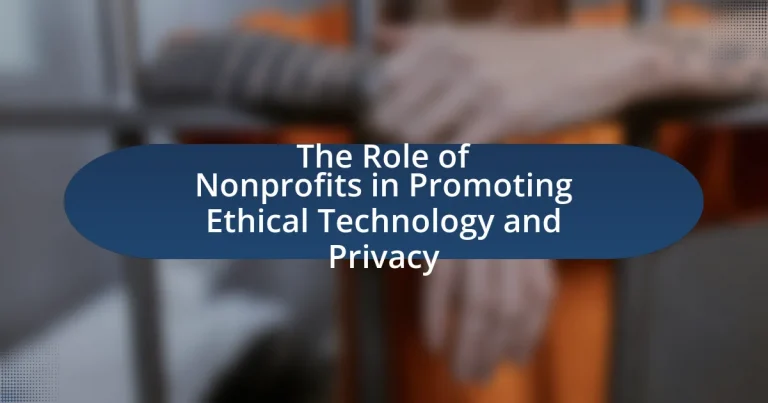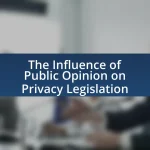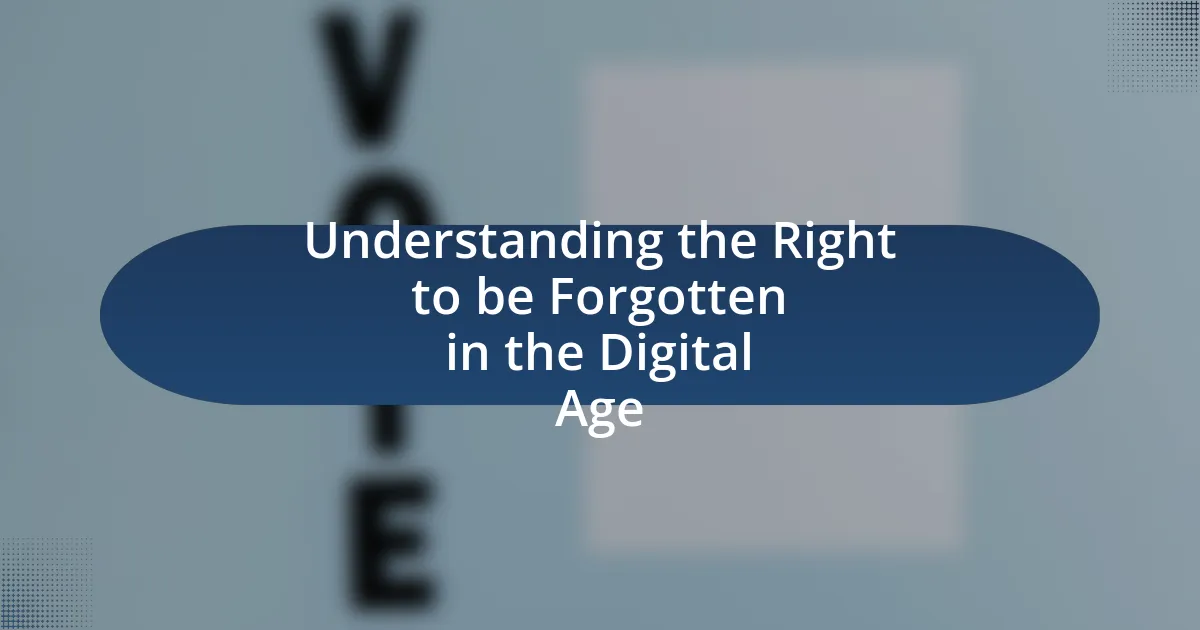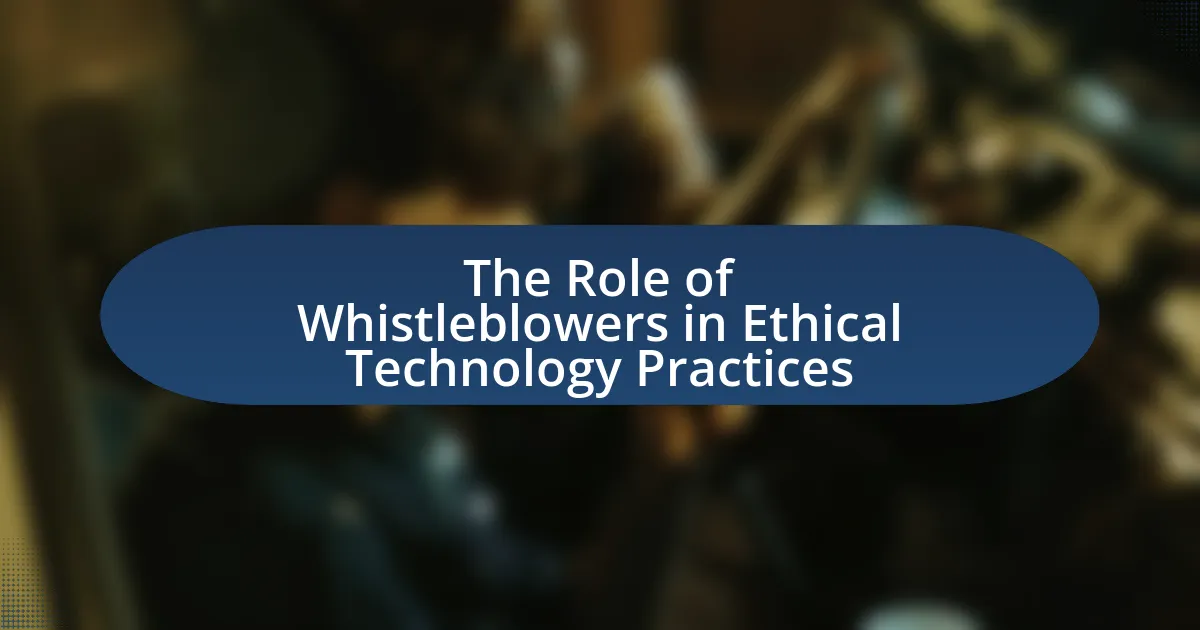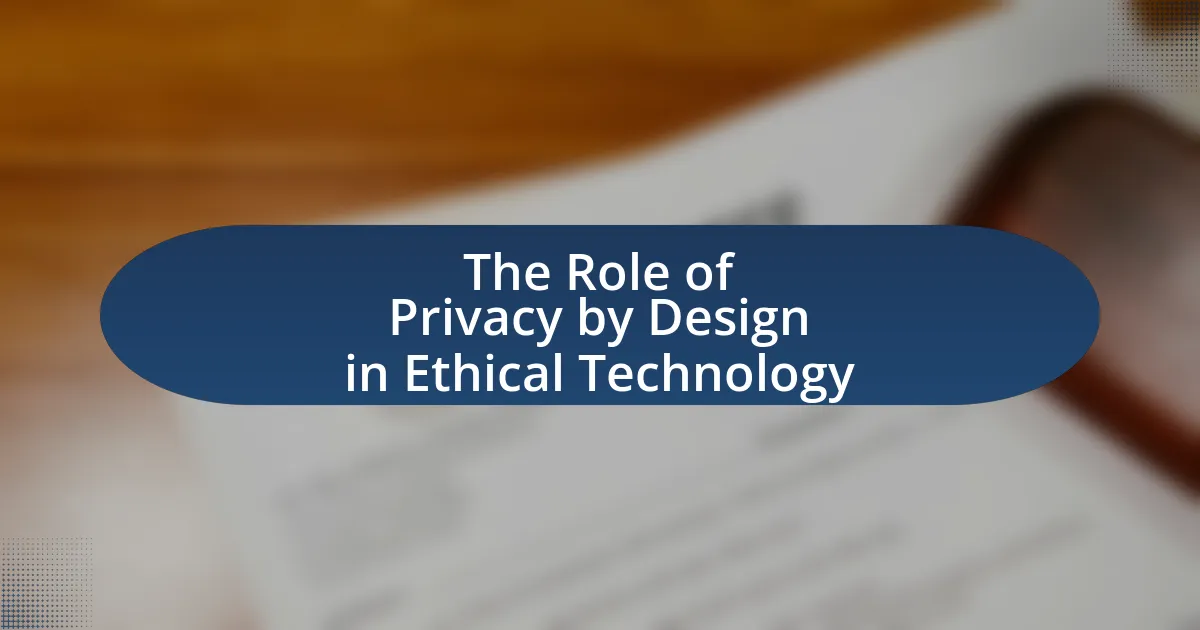Nonprofits play a vital role in promoting ethical technology and privacy by advocating for responsible practices, educating the public, and influencing policy. They address critical privacy concerns arising from data breaches, surveillance, and inadequate consent mechanisms, while also collaborating with tech companies to develop ethical guidelines. Through public awareness campaigns and policy advocacy, organizations like the Electronic Frontier Foundation and the Center for Democracy & Technology enhance public understanding of digital rights and privacy issues. The article explores the specific initiatives led by nonprofits, their strategies for engagement, and the challenges they face in advocating for ethical technology in an evolving landscape.
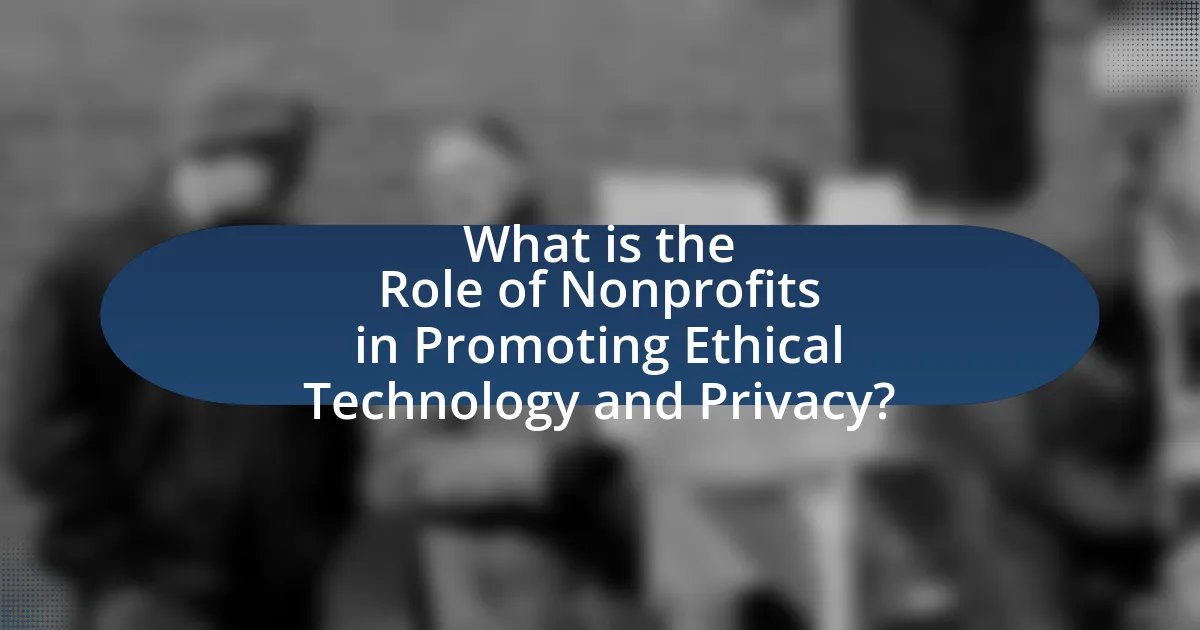
What is the Role of Nonprofits in Promoting Ethical Technology and Privacy?
Nonprofits play a crucial role in promoting ethical technology and privacy by advocating for responsible practices, educating the public, and influencing policy. These organizations often focus on raising awareness about data privacy issues, such as the implications of surveillance and data collection, and they provide resources to help individuals understand their rights. For instance, organizations like the Electronic Frontier Foundation (EFF) actively campaign for digital rights and privacy protections, influencing legislation and corporate practices. Additionally, nonprofits often collaborate with tech companies to develop ethical guidelines and standards, ensuring that technology serves the public good while respecting individual privacy.
How do nonprofits influence the development of ethical technology?
Nonprofits influence the development of ethical technology by advocating for responsible practices, conducting research, and providing frameworks for ethical standards. Organizations like the Electronic Frontier Foundation and the Center for Democracy & Technology actively promote policies that prioritize user privacy and data protection, shaping industry norms. Their research often highlights the implications of technology on society, guiding developers and policymakers toward more ethical decisions. For instance, the work of nonprofits has led to increased awareness of issues like algorithmic bias and surveillance, prompting tech companies to adopt more transparent and equitable practices.
What strategies do nonprofits use to advocate for ethical technology?
Nonprofits advocate for ethical technology through strategies such as public awareness campaigns, policy advocacy, and collaboration with tech companies. Public awareness campaigns educate the public about ethical technology issues, such as data privacy and algorithmic bias, thereby fostering informed consumer choices. Policy advocacy involves lobbying for regulations that promote transparency and accountability in technology, as seen in initiatives like the General Data Protection Regulation (GDPR) in Europe, which was influenced by nonprofit efforts. Collaboration with tech companies allows nonprofits to engage in dialogue and influence corporate practices, exemplified by partnerships with organizations like the Electronic Frontier Foundation, which works to ensure that technology serves the public interest. These strategies collectively enhance the ethical landscape of technology.
How do nonprofits collaborate with tech companies to promote ethics?
Nonprofits collaborate with tech companies to promote ethics by engaging in partnerships that focus on developing ethical guidelines and best practices for technology use. These collaborations often involve joint initiatives, such as creating frameworks for data privacy, responsible AI usage, and digital inclusion. For instance, organizations like the Electronic Frontier Foundation work with tech firms to advocate for user rights and transparency in data handling, demonstrating the effectiveness of such partnerships in shaping ethical standards in the tech industry.
Why is privacy a critical concern in technology today?
Privacy is a critical concern in technology today due to the increasing amount of personal data collected by companies and the potential for misuse. With over 4.9 billion internet users globally, the vast quantities of data generated create significant risks for individuals, including identity theft and unauthorized surveillance. Reports indicate that 79% of Americans are concerned about how their data is being used by companies, highlighting the widespread anxiety surrounding privacy. Furthermore, incidents like the Cambridge Analytica scandal, where personal data from millions of Facebook users was harvested without consent, underscore the urgent need for robust privacy protections. As technology continues to evolve, the ethical implications of data handling and the necessity for transparency become paramount, making privacy a central issue in the discourse on technology today.
What are the main privacy issues that arise with technology use?
The main privacy issues that arise with technology use include data breaches, surveillance, and inadequate consent mechanisms. Data breaches occur when unauthorized individuals access sensitive information, affecting millions; for instance, the 2017 Equifax breach exposed personal data of 147 million people. Surveillance practices, often conducted by governments and corporations, raise concerns about the erosion of personal privacy, as seen in the widespread use of facial recognition technology. Inadequate consent mechanisms lead to users unknowingly sharing their data, as highlighted by studies showing that many individuals do not read privacy policies before agreeing to them. These issues underscore the need for ethical standards in technology to protect user privacy.
How do nonprofits address privacy concerns in their initiatives?
Nonprofits address privacy concerns in their initiatives by implementing robust data protection policies and practices. These organizations often adopt transparent data collection methods, ensuring that individuals are informed about how their information will be used. For instance, many nonprofits utilize privacy impact assessments to evaluate risks associated with data handling, which helps in identifying and mitigating potential privacy issues. Additionally, nonprofits frequently engage in training staff on data privacy regulations, such as the General Data Protection Regulation (GDPR), to ensure compliance and protect user information. By fostering a culture of privacy awareness and accountability, nonprofits can effectively safeguard the personal data of their stakeholders while maintaining trust and integrity in their initiatives.
What impact do nonprofits have on public awareness of ethical technology?
Nonprofits significantly enhance public awareness of ethical technology by advocating for responsible practices and educating communities about the implications of technology on society. Through campaigns, workshops, and research initiatives, organizations like the Electronic Frontier Foundation and the Center for Democracy & Technology actively inform the public about issues such as data privacy, algorithmic bias, and digital rights. For instance, the Electronic Frontier Foundation has published numerous resources that clarify complex technological concepts, making them accessible to a broader audience. This educational outreach fosters informed discussions and encourages individuals to engage with ethical technology issues, ultimately shaping public perception and policy.
How do nonprofits educate the public about ethical technology practices?
Nonprofits educate the public about ethical technology practices through awareness campaigns, workshops, and educational resources. These organizations often create informative content, such as articles, webinars, and social media posts, to highlight the importance of ethical technology use. For instance, the Electronic Frontier Foundation provides resources that explain digital privacy rights and ethical technology practices, helping individuals understand their rights and responsibilities in the digital age. Additionally, nonprofits may collaborate with schools and community organizations to conduct training sessions that focus on responsible technology use, thereby fostering a culture of ethical awareness among diverse audiences.
What role do nonprofits play in shaping public policy regarding technology and privacy?
Nonprofits play a crucial role in shaping public policy regarding technology and privacy by advocating for ethical standards and influencing legislative processes. They engage in research, raise public awareness, and mobilize communities to address issues such as data protection and digital rights. For instance, organizations like the Electronic Frontier Foundation have successfully lobbied for stronger privacy laws and transparency in data usage, demonstrating their impact on policy outcomes. Additionally, nonprofits often collaborate with policymakers to draft legislation that reflects public interest, ensuring that technology development aligns with societal values.
How do nonprofits measure their effectiveness in promoting ethical technology?
Nonprofits measure their effectiveness in promoting ethical technology through various metrics, including stakeholder engagement, impact assessments, and policy influence. Stakeholder engagement is evaluated by tracking participation rates in programs and initiatives aimed at ethical technology, which can indicate community interest and support. Impact assessments involve analyzing the outcomes of specific projects, such as improvements in data privacy practices or increased awareness of ethical technology issues, often supported by surveys or case studies. Additionally, nonprofits assess their policy influence by monitoring changes in legislation or corporate practices that align with ethical technology principles, demonstrating their role in shaping the broader discourse. For example, a nonprofit may report a measurable increase in compliance with ethical standards among tech companies after advocacy efforts, providing concrete evidence of their effectiveness.
What challenges do nonprofits face in advocating for privacy and ethics?
Nonprofits face significant challenges in advocating for privacy and ethics, primarily due to limited resources and funding. These organizations often operate with constrained budgets, which restricts their ability to conduct extensive research, develop comprehensive advocacy campaigns, and engage in public education efforts. Additionally, nonprofits may struggle to influence policy effectively because they lack the lobbying power and connections that larger corporations possess. According to a report by the National Council of Nonprofits, 70% of nonprofits cite funding as a major barrier to their advocacy efforts, highlighting the financial constraints that hinder their ability to promote privacy and ethical standards. Furthermore, the rapidly evolving technology landscape complicates advocacy, as nonprofits must continuously adapt to new privacy challenges and ethical dilemmas, often without the necessary expertise or technological support.

What are the specific initiatives led by nonprofits in this field?
Nonprofits in the field of promoting ethical technology and privacy lead several specific initiatives, including advocacy for data protection legislation, educational programs on digital privacy rights, and the development of ethical technology standards. For instance, organizations like the Electronic Frontier Foundation (EFF) actively lobby for stronger privacy laws and provide resources to educate the public about their digital rights. Additionally, the Center for Democracy & Technology (CDT) works on initiatives that promote transparency in technology practices and support policies that protect user privacy. These efforts are crucial in shaping a more ethical technological landscape and ensuring that privacy rights are upheld in the digital age.
What types of programs do nonprofits implement to promote ethical technology?
Nonprofits implement various programs to promote ethical technology, including advocacy initiatives, educational workshops, and collaborative projects. Advocacy initiatives focus on influencing policy and legislation to ensure ethical standards in technology use, such as data privacy laws. Educational workshops aim to raise awareness about ethical technology practices among communities and organizations, providing training on responsible technology use. Collaborative projects often involve partnerships with tech companies and other stakeholders to develop ethical guidelines and best practices, ensuring that technology serves the public good. These programs are essential in fostering a culture of accountability and transparency in the tech industry.
How do these programs engage with communities and stakeholders?
These programs engage with communities and stakeholders through collaborative initiatives, educational outreach, and advocacy efforts. Nonprofits often partner with local organizations to host workshops and seminars that raise awareness about ethical technology and privacy issues, thereby fostering community involvement. For instance, organizations like the Electronic Frontier Foundation conduct community forums to discuss digital rights, which directly involve stakeholders in the conversation. Additionally, these programs may utilize surveys and feedback mechanisms to understand community needs and adapt their strategies accordingly, ensuring that stakeholder voices are heard and integrated into program development.
What success stories can be highlighted from nonprofit initiatives?
Nonprofit initiatives have successfully advanced ethical technology and privacy through various impactful projects. One notable success story is the Electronic Frontier Foundation (EFF), which has played a crucial role in advocating for digital privacy rights and has influenced legislation to protect user data. The EFF’s efforts contributed to the passage of the California Consumer Privacy Act (CCPA), which enhances consumer privacy rights and holds companies accountable for data misuse. Another example is the Mozilla Foundation, which has promoted open-source technology and privacy-focused web standards, leading to the development of tools like Firefox Focus that prioritize user privacy. These initiatives demonstrate how nonprofits can effectively drive change in technology ethics and privacy protection.
How do nonprofits collaborate with other organizations to enhance their impact?
Nonprofits collaborate with other organizations to enhance their impact by forming strategic partnerships that leverage shared resources, expertise, and networks. For instance, nonprofits often engage in joint initiatives with businesses, government agencies, and academic institutions to address complex social issues, such as digital privacy and ethical technology. These collaborations can lead to increased funding, access to new technologies, and broader outreach capabilities. A notable example is the partnership between the Electronic Frontier Foundation and various tech companies to advocate for stronger privacy protections, demonstrating how collective efforts can amplify advocacy and influence policy changes effectively.
What partnerships are most effective in promoting ethical technology?
Collaborations between nonprofits, technology companies, and academic institutions are the most effective partnerships in promoting ethical technology. These partnerships leverage the expertise of nonprofits in advocacy and ethical standards, the innovation capabilities of tech companies, and the research foundation provided by academic institutions. For instance, the partnership between the Electronic Frontier Foundation and various tech firms has led to significant advancements in digital rights and privacy protections, demonstrating the effectiveness of such collaborations in shaping ethical technology practices.
How do collaborations help in addressing privacy issues?
Collaborations help in addressing privacy issues by pooling resources, expertise, and diverse perspectives to create comprehensive solutions. Nonprofits, technology companies, and policymakers can work together to establish best practices, share knowledge about emerging threats, and develop tools that enhance user privacy. For instance, the collaboration between the Electronic Frontier Foundation and various tech firms has led to the development of privacy-enhancing technologies that protect user data. Such partnerships can also facilitate advocacy for stronger privacy regulations, as seen in initiatives like the General Data Protection Regulation (GDPR) in Europe, which emerged from collaborative efforts among various stakeholders.
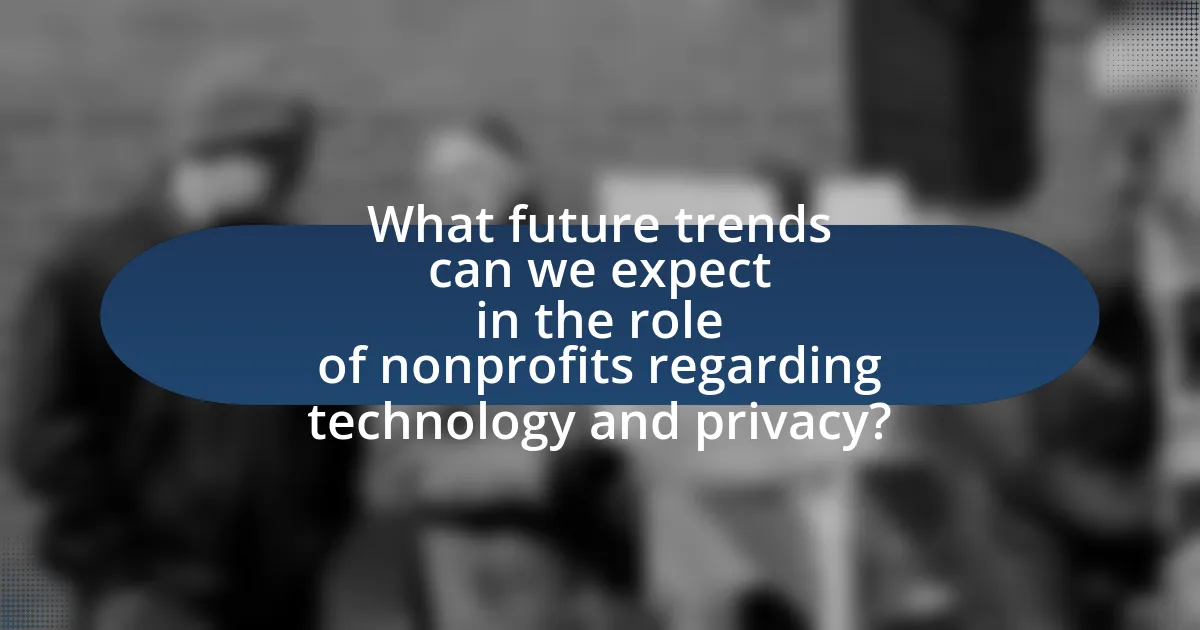
What future trends can we expect in the role of nonprofits regarding technology and privacy?
Nonprofits will increasingly focus on advocating for ethical technology practices and privacy rights in the future. As technology evolves, nonprofits are expected to play a crucial role in shaping policies that protect user data and promote transparency in tech companies. For instance, the rise of data privacy regulations, such as the General Data Protection Regulation (GDPR) in Europe, highlights the growing importance of privacy advocacy, which nonprofits are likely to champion. Additionally, nonprofits will leverage technology to enhance their outreach and engagement, utilizing data analytics to better understand community needs while ensuring compliance with privacy standards. This dual focus on advocacy and responsible technology use will position nonprofits as key players in the ongoing dialogue about ethical technology and privacy.
How might the landscape of ethical technology evolve in the coming years?
The landscape of ethical technology is likely to evolve towards increased regulation and collaboration among stakeholders, driven by growing public awareness and demand for accountability. As technology continues to advance, nonprofits will play a crucial role in advocating for ethical standards and privacy protections, influencing policy changes and fostering partnerships between tech companies and civil society. For instance, the General Data Protection Regulation (GDPR) in Europe has set a precedent for data privacy laws, prompting similar initiatives globally. This trend indicates that ethical technology will increasingly prioritize user rights and transparency, supported by nonprofit organizations that champion these values.
What emerging technologies pose new ethical challenges for nonprofits?
Emerging technologies such as artificial intelligence, blockchain, and big data analytics pose new ethical challenges for nonprofits. These technologies can lead to issues related to data privacy, algorithmic bias, and transparency. For instance, the use of AI in decision-making processes can inadvertently perpetuate biases if the underlying data is flawed, which can affect marginalized communities disproportionately. Additionally, blockchain’s promise of transparency raises concerns about the permanence of data and the potential for misuse. Nonprofits must navigate these challenges to uphold ethical standards while leveraging technology for social good.
How can nonprofits adapt to changing technology trends to remain effective?
Nonprofits can adapt to changing technology trends by embracing digital tools and platforms that enhance their outreach and operational efficiency. For instance, utilizing social media for fundraising and awareness campaigns allows nonprofits to engage a broader audience, as evidenced by the 2020 Nonprofit Trends Report, which highlighted that 70% of nonprofits increased their online donations through social media engagement. Additionally, adopting data analytics can help nonprofits better understand their impact and optimize their programs, with studies showing that organizations using data-driven decision-making are 5 times more likely to achieve their goals. By investing in training for staff on new technologies, nonprofits can ensure they remain competitive and effective in fulfilling their missions.
What practical steps can nonprofits take to enhance their advocacy for ethical technology?
Nonprofits can enhance their advocacy for ethical technology by developing clear policy positions and engaging in public education campaigns. Establishing specific guidelines on ethical technology use helps nonprofits articulate their stance and influence policy discussions. For instance, organizations like the Electronic Frontier Foundation have successfully advocated for digital rights by providing resources and training on privacy issues. Additionally, collaborating with tech companies to promote ethical practices can lead to more responsible technology development. Research shows that partnerships between nonprofits and industry leaders can drive significant change, as seen in initiatives like the Partnership on AI, which aims to ensure that artificial intelligence is developed responsibly.
